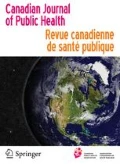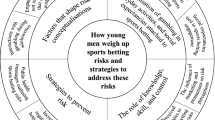Abstract
Objective
Despite the risks associated with poker and its unique characteristics when compared with other forms of gambling, little knowledge exists of poker players’ perceptions of prevention strategies. The aim of this study was to explore poker players’ perceptions and understandings of existing problem gambling prevention strategies.
Methods
This exploratory qualitative study is a secondary data analysis of interviews conducted as a part of a sequential mixed-methods research project, with 12 poker players.
Results
Two main themes emerged from the thematic analysis highlighting a distinction between institutional and personal prevention strategies. When speaking about institutional prevention efforts, players were critical of existing formats, messages, and who these messages were being developed and disseminated by and for. Players believed existing messaging strategies demonstrate an overall lack of awareness concerning the reality of poker. Personal preventive strategies that players themselves put in place to reduce risks included money management, playing for free, maintaining a healthy play-life balance, and managing emotions, to be aware of their relationship with poker, as well as spotting paying opportunities.
Conclusions
Given poker players’ lack of receptivity to existing prevention messaging, it is essential to consider the unique nature of poker and its players. It is also imperative to explore the potential benefits of collaborating with players when it comes to targeted prevention strategies.
Résumé
Objectif
Malgré les risques associés au poker et ses caractéristiques uniques comparé aux autres formes de jeux de hasard et d’argent, la perception des joueurs de poker quant aux stratégies de prévention reste méconnue. L’objectif de cette étude est d’explorer les perceptions et la compréhension des joueurs de poker quant aux stratégies de prévention existantes pour les problèmes de jeu.
Méthode
Cette étude qualitative exploratoire repose sur des analyses de données secondaires d’entrevues réalisées auprès de 12 joueurs de poker d’un projet empruntant un devis de recherche mixte séquentiel.
Résultats
Deux thèmes principaux ont émergé de l’analyse thématique, soulignant la distinction entre les stratégies de prévention institutionnelles et personnelles. Lorsqu’il s’agit de prévention institutionnelle, les joueurs ont critiqué les formats, les messages et par qui les messages étaient élaborés et diffusés. Les joueurs ont estimé que les stratégies existantes démontraient un manque général de connaissance de la réalité du poker. Les stratégies de prévention personnelles que les joueurs mettent en place par eux-mêmes pour réduire les risques comprennent la gestion de l’argent, jouer gratuitement, maintenir un équilibre entre le poker et la vie personnelle et gérer ses émotions, prendre conscience de sa relation avec le poker, ainsi que le repérage des opportunités payantes.
Conclusions
Étant donné le manque de réceptivité des joueurs de poker aux messages de prévention existants, il est essentiel de considérer la nature unique du poker et de ses joueurs. Il est également impératif d’explorer les avantages potentiels d’une collaboration avec les joueurs de poker lorsqu’il s’agit de stratégies de prévention ciblées.
Similar content being viewed by others
References
Abarbanel, B. L., & Bernhard, B. J. (2012). Chicks with decks: the female lived experience in poker. International Gambling Studies, 12(3), 367–385.
Auer, M., & Griffiths, M. D. (2013). Voluntary limit setting and player choice in most intense online gamblers: an empirical study of gambling behaviour. Journal of Gambling Studies, 29(4), 647–660.
Barrault, S., & Varescon, I. (2013). Impulsive sensation seeking and gambling practice among a sample of online poker players: comparison between non-pathological, problem and pathological gamblers. Personality and Individual Differences, 55, 502–509.
Barrault, S., Untas, A., & Varescon, I. (2014). Special features of poker. International Gambling Studies, 14(3), 492–504.
Brisson, P. (2014). Prévention des toxicomanies: Aspects théoriques et méthodologiques. Montreal: Presses de l’Université de Montréal.
Cision. (2013). Loto-Québec lance la campagne – Le Jeu doit rester un jeu. https://www.newswire.ca/fr/news-releases/loto-quebec-lance-la-campagne%2D%2D-le-jeu-doit-rester-un-jeu-512131131.html. Accessed 8 Nov 2019.
Dorais, M. (2017). Prévenir, mais comment? In M. Dorais (Ed.), Prévenir (pp. 5–74). Québec: Presse de l’Université Laval.
Dufour, M., Petit, S., & Brunelle, N. (2012). La perception du poker selon les joueurs adeptes: Un jeu qui les distingue. Criminologie, 45(2), 7–26.
Ferris, J., & Wynne, H. (2001). The Canadian problem gambling index: final report. Report. Canadian Centre on Substance Abuse. www.ccgr.ca/en/projects/resources/CPGI-Final-Report-English.pdf. Accessed 29 Apr 2019.
Fortin, M. F. (2010). Fondements et étapes du processus de recherche: Méthodes quantitatives et qualitatives. Montreal: Chenelière Education.
Gainsbury, S., Abarbanel, B., Philander, K., & Butler, J. (2018). Strategies to customize responsible gambling messages: a review and focus group study. BMC Public Health, 18(1), 1381.
Graneheim, U., & Lundman, B. (2004). Qualitative content analysis in nursing research: concepts, procedures and measures to achieve trustworthiness. Nurse Education Today, 24(2), 105–112.
Hopley, A. B., Dempsey, K., & Nicki, R. (2012). Texas Hold’Em online poker: A further examination. International Journal of Mental Health and Addiction, 10, 563–572.
Kairouz, S., Nadeau, L., & Paradis, C. (2010). Portrait du jeu au Québec: Prévalence, incidence et trajectoires sur quatre ans. Report. Research Chair on Gambling Studies, Concordia University. https://www.concordia.ca/content/dam/artsci/research/lifestyle-addiction/docs/projects/enhjeu-q/ENHJEU-QUEBEC-Report-28-April-2011-Final.pdf. Accessed 29 Apr 2019.
Kairouz, S., Paradis, C., & Monson, E. (2016). Gender, gambling settings, and gambling behaviors among undergraduate poker players. International Gambling Studies, 16(1), 85–97.
Khazaal, Y., Chatton, A., Bouvard, A., Khiari, H., Achab, S., & Zullino, D. (2013). Internet poker websites and pathological gambling prevention policy. Journal of Gambling Studies, 29(1), 51–59.
Laakasuo, M., Palomäki, J., & Salmela, M. (2015). Emotional and social factors influence poker decision making accuracy. Journal of Gambling Studies, 31(3), 933–947.
Loto-Québec (2019). Les jeux expliqués – Le poker. https://lejeudoitresterunjeu.lotoquebec.com/fr/comprendre-hasard/jeux-expliques#le-poker. Accessed 8 Nov 2019.
McCormack, A., & Griffiths, M. D. (2013). A scoping study of the structural and situational characteristics of Internet gambling. International Journal of Cyber Behavior, Psychology and Learning, 3(1), 29–49.
Miller, H. E., Thomas, S. L., & Robinson, P. (2018). From problem people to addictive products: a qualitative study on rethinking gambling policy from the perspective of lived experience. Harm Reduction Journal, 15, 16.
Morvannou, A. (2017). La passion du jeu chez les joueurs de poker: Étude de recherche mixte. Unpublished doctoral dissertation. Université de Sherbrooke, Longueuil, Quebec.
Morvannou, A., Dufour, M., Brunelle, N., & Roy, É. (2018). Être passionné un peu, beaucoup, énormément ? Le concept de la passion chez les joueurs de poker, une étude qualitative (Slightly, very or extremely passionate: the concept of passion among poker players: a qualitative study). Journal of Gambling Issues, 38, 100–126.
Paillé, P., & Mucchielli, A. (2012). L’analyse qualitative en sciences humaines et sociales (3rd ed.). Paris: Armand Colin.
Parke, J., & Griffiths, M. (2011). Poker gambling virtual communities: the use of computer-mediated communication to develop cognitive poker gambling skills. International Journal of Cyber Behavior, Psychology and Learning, 1(2), 31–44.
Pavelko, R. L., Myrick, J. G., Verghese, R. S., & Hester, J. B. (2017). Public reactions to celebrity cancer disclosures via social media: implications for campaign message design and strategy. Health Education Journal, 76(4), 492–506.
Richards, L. (2008). Handling Qualitative Data: A Practical Guide. Sage Publications, London.
Rodda, S. N., Bagot, K. L., Manning, V., & Lubman, D. (2019). ‘Only take the money you want to lose’ strategies for sticking to limits in electronic gaming machine venues. International Gambling Studies, 19(3), 489–507.
Rousseau, F. L., Vallerand, R. J., Ratelle, C. F., Mageau, G. A., & Provencher, P. J. (2002). Passion and gambling: on the validation of the Gambling Passion Scale (GPS). Journal of Gambling Studies, 18, 45–66.
Substance Abuse and Mental Health Services Administration (SAMHSA). (2019). Focus on prevention. Report. https://store.samhsa.gov/system/files/sma10-4120.pdf. Accessed 30 Apr 2019.
Tanner, J., Drawson, A. S., Mushquash, C. J., Mushquash, A. R., & Mazmanian, D. (2017). Harm reduction in gambling: a systematic review of industry strategies. Addiction Research & Theory, 25(6), 485–494.
Vines, M., & Linders, A. (2016). The dirty work of poker: impression management and identity. Deviant Behavior, 37(9), 1–13.
Williams, R. J., West, B. L., & Simpson, R. I. (2012). Prevention of Problem Gambling: A Comprehensive Review of the Evidence, and Identified Best Practices. Report prepared for the Ontario Problem Gambling Research Centre and the Ontario Ministry of Health and Long Term Care.
Acknowledgements
The authors would like to thank the participants and the members of the research team.
Funding
This research was supported by the founding agency Fonds québécois de la recherche sur la société et la culture under grant <2012-JU-164313>.
Author information
Authors and Affiliations
Corresponding author
Ethics declarations
Conflict of interest
The authors declare that they have no conflict of interest.
Additional information
Publisher’s note
Springer Nature remains neutral with regard to jurisdictional claims in published maps and institutional affiliations.
Rights and permissions
About this article
Cite this article
Morvannou, A., Monson, E., Savard, AC. et al. “It did not apply to me”: poker players’ perspectives of prevention messages. Can J Public Health 111, 617–626 (2020). https://doi.org/10.17269/s41997-019-00283-4
Received:
Accepted:
Published:
Issue Date:
DOI: https://doi.org/10.17269/s41997-019-00283-4



